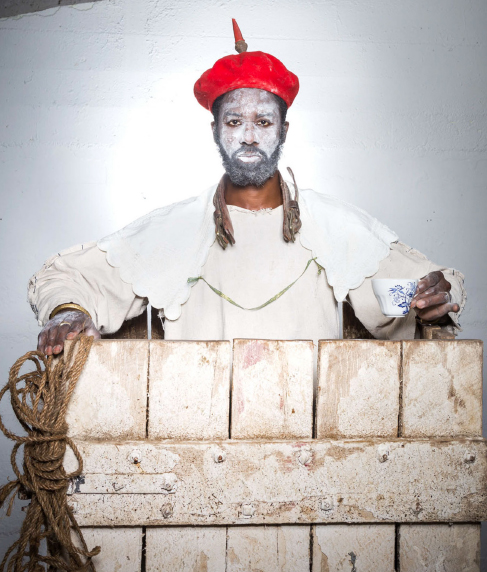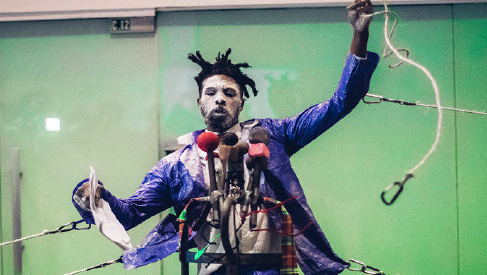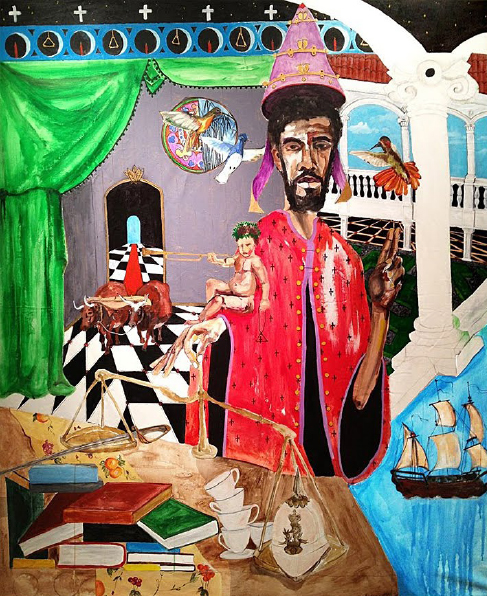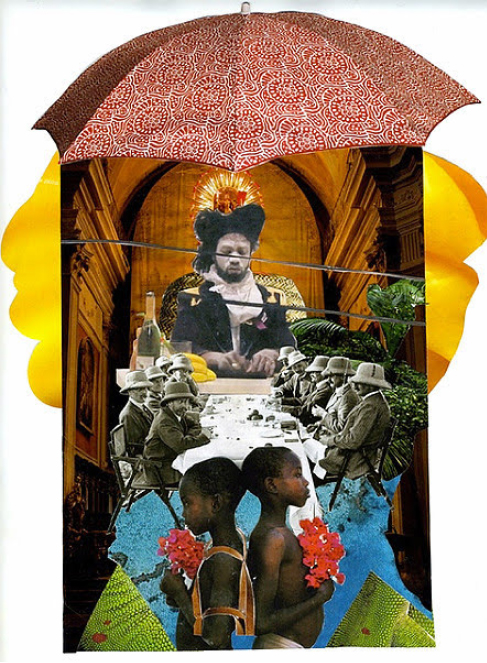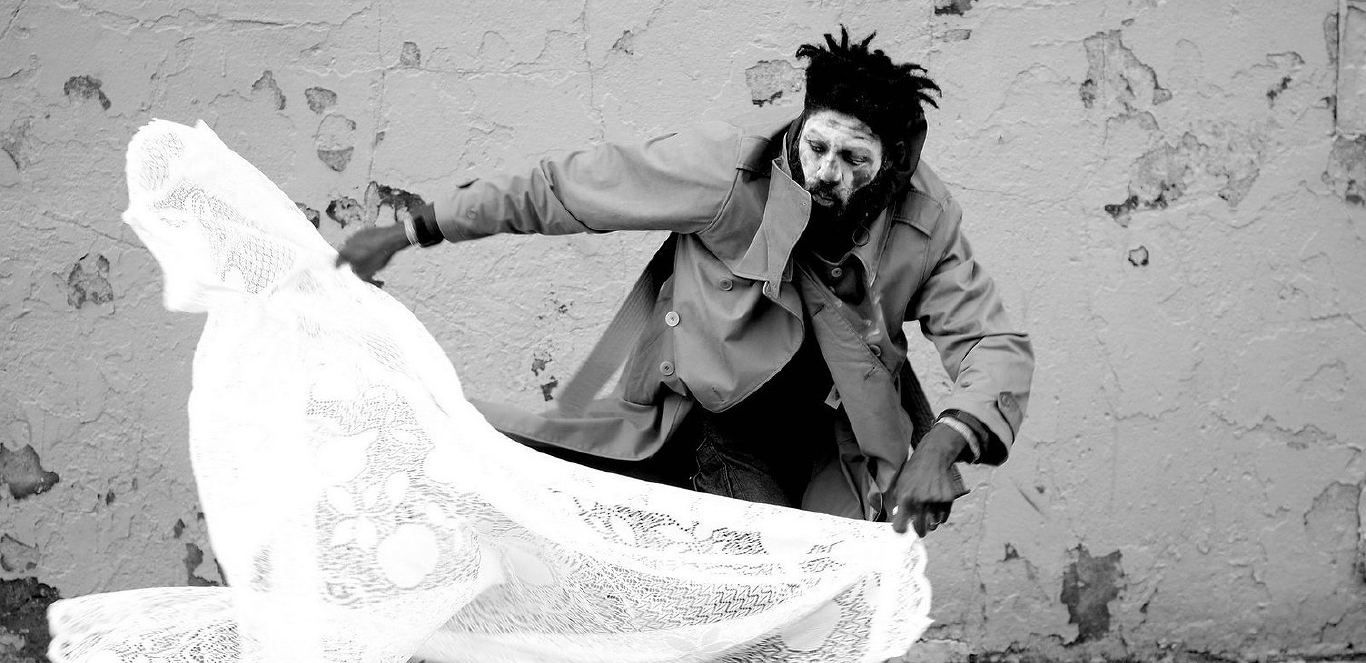
Nyugen E. Smith
A Lens of the Past to Envision a Future
There is ritual each time a spirit is called to intervene in
human affairs.
—Malidoma Patrice Somé[1]
Excavating indigenous
roots
slithering
through old
corridors scrambling geographies
of empire
remapping new
world cacophonic
routes inventing
collective
epistemic
imaginaries
moving
beyond somatic
liberation recharting
cartographies of convergences
dissidence
overstretchin
diasporas
into outer/spaces
—Gina Athena Ulysse[2]
Nyugen Smith identifies as a multidisciplinary artist. His oeuvre of work includes painting, writing, mixed media drawing, and performance. Smith’s sculptures from found objects reveal the influence of both his Haitian and Trinidadian heritage, specifically. Yet, generally, Smith embodies an African Diasporic positionality of artists as a cultural worker. The themes of his work attend to trauma, displacement, cosmology, and decolonization, particularly of people of African descent.
Upon completing his MFA work, he received the Leonore Annenberg Performing and Visual Arts Fund, followed by others such as Franklin Furnace Fund, Dr. Doris Derby Award, and Joan Mitchell Foundation Painters and Sculptors Grant. The recognition bespeaks Smith’s astute creative production and his capacity to endeavor the complexities and complications of the diasporic narrative.For said reasons, Smith was selected in the premier class of Artists in Residence of Indigo Arts Alliance.
His scheduled residency was upended with the emergence of the COVID-19 pandemic. It was Smith who approached Indigo with there-imagined residency. Rasanblaj is a convening. A Haitian concept born out of the revolution, and uniquely configured to suggest a summoning to devise strategies, a regrouping is an act to bring community together to affirm the existence of its members. As Ulysse defines above, it is collective epistemic imaginaries moving beyond somatic liberation recharting cartographies of convergences dissidence over-stretching diasporas into outer/spaces. Rasanblaj is a gathering to engage in generative conversation to contemplate paths of liberation. This concept comes to mind when I think of Nyugen Smith’s ingenuity and creative energy to propose curating three distinct conversations with artists, thinkers, and medical professionals of African descent to discuss the impact of the coronavirus pandemic on Black and Brown residency communities locally and globally.
The series, titled The Wave, connotes, according to Smith, the constant movement of Black bodies and the unpredictable nature of the pandemic. It conjures the fluid and moving nature of the coronavirus and ongoing nature of the trauma of Black life. It is a reminder of the forced removal and displacement of Black bodies and the continued complicated efforts towards decolonization. The panels as envisioned by Smith, observe the past to a forward interrogation of the present to claim a future.
Between May and June 2020, three live-streamed video conversations aired on the Facebook platform. Each panel attended to a specific topic; for example, the theme of the first panel was Exodus (movement of people). The conversation unpacked the intended and unintended consequences of government policies that impact immigrant and migrant communities of color. Pre-existing conditions was the theme of the second dialogue, which took up the issue of personal health and responsibility and the social determinates such as discrimination, low rage employment, and food insecurity that contribute to the disproportionately high coronavirus cases and mortality rate among communities of color. The theme of the final and third panels was Spiritual Sustenance. The panel shared specific ways in which ritual and spiritual practice functioned as a tactic of coping during the pandemic. The panel consisted of testimonials that harkened the need to rekindle and engage in more fully Africana cosmology. The act of reaching back to embrace the ancestral energy to support during this trying moment. A key function of Africana ritual performance is its connectivity with the ancestors. In order to move forward in a western construction of chronemics is to look to the past, not only to acknowledge the ancestors but to engage with their presence is everyday lived realities.
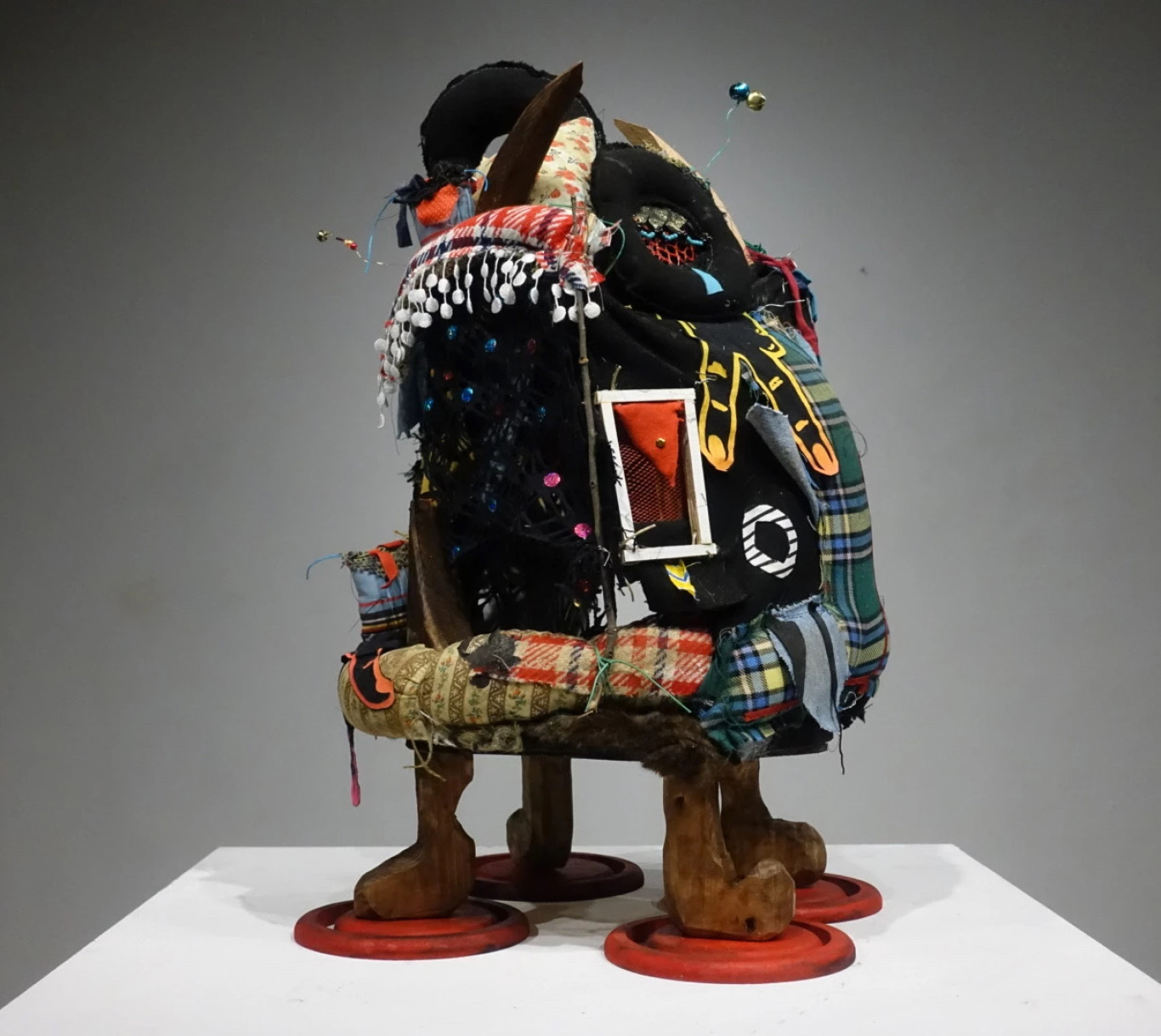
The panels conceived by Nyugen Smith are a series of ritual performances. Africana ritual practices are the foundations for what we come to know and theorize as performance. Theories in which we locate both theatricality and performance of everyday life and from which we inherit performance art. The domain of performance/performance art is placed on the margins of creative production and viewed with suspicion because it is a genre that does not fit neatly in the gallery or museum space. Its position outside demarcated art spaces fulfills a capacity to critique creative institutions, society, and political injustices and bring communities together. As ritual performances, they remind us of the healing power of summoning a community together—pause and contemplate in the words of Somé: “ritual draws from…human existence where the sprite plays a life-giving role….our role in ritual is to be human.”[3]
The Wave as a set of ritual performances, enacted before a global audience—in which Smith opens with scripted introductions—then gives way to a poet/spoken word artist. Each panel included a poet as an invocation to the ceremony. Then guided through the session, the moderator poses open-ended questions for the panelist, which included a network journalist, a physician, a doula, an interdisciplinary artist, and a Yoruba priestess; all BIPOC from various walks of life. As the discussion ensued, time was suspended: the intentional and deliberate manner in which the participants spoke was palpable. The level of emotions displayed and articulated gave way to an enraptured audience, as evidenced in the chatbox. Where earlier statements began with “congratulations” to more ardent and sentimental comments, “I am weeping with joy at this moment,” to “please continue…I need more of this…I listened and cried.” Through the mediated platform of Facebook, the audience was invited to observe and participate. The intimacy displayed through the panelists’ vulnerability released the “professional” identities to the bare display of humanity. Ritual asks of us to be human.
The shaman who both healed and guided the community spiritually served as the archivist—the holder of history—and could foretell the future. A future not just of racial solidarity and peace, but one of self-affirmation and the act of loving be Black. Nyugen Smith, drawing from his Caribbean ingenuity summoned a Rasanblaj and leading an audience through rituals, is a Shaman. Like so many of his performances from Untitled (they reclaimed my body at sea) (2013) to While you sleep (2019), his work invites ritual performances in which he leads audiences toward healing. The Wave was a series of ritual performances to and for the community, interrogating the now through a lens of the past to envision a future.
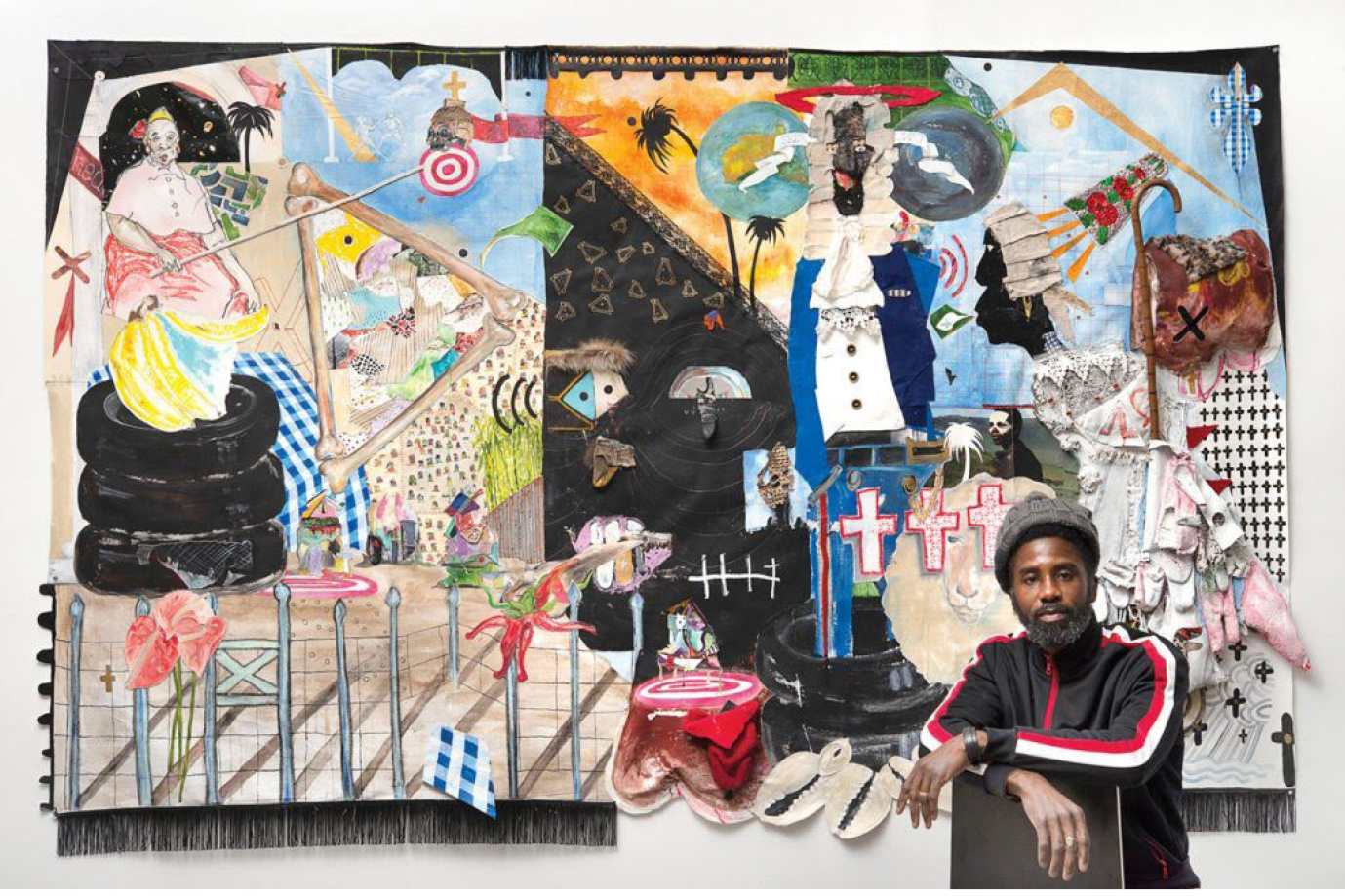
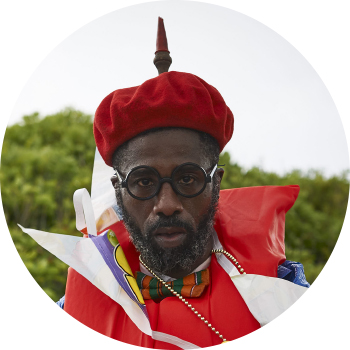
NYUGEN E. SMITH
Nyugen E. Smith is a first generation Caribbean-American interdisciplinary artist and educator living and working in Jersey City, NJ. Responding to the legacy of European colonial rule in the African diaspora, his work considers imperialist practices of oppression, violence, and intergenerational trauma. He Is interested in ritual and sacred practice rooted in African spiritual systems and how they are employed as coping mechanisms and tools for collective empowerment. He holds a BA from Seton Hall University and an MFA from The School of the Art Institute of Chicago. He has conducted public programs, visiting artist lectures, and panel discussions at institutions including the Schomburg Center for Research in Black Culture, New York; The Studio Museum in Harlem, New York; Massachusetts College of Art and Design, Boston, MA. Awards: 2016 Leonore Annenberg Performing and Visual Arts Fund, 2018 Franklin Furnace Fund, 2018 Joan Mitchell Foundation Painters and Sculptors Grant.
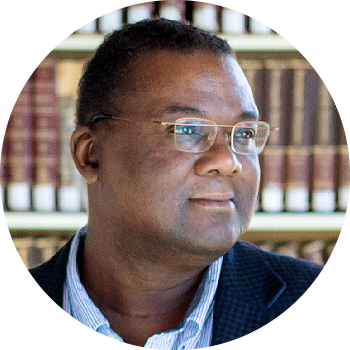
DR. MYRON BEASLEY
Myron M. Beasley, Ph.D., is a cultural critic, international curator, and performance artist. His work includes exploring the intersection of cultural politics, art, and social change, as he believes in the power of artists and recognizes them as cultural workers; He has been awarded fellowships and grants by the Andy Warhol Foundation, the Whiting Foundation, National Endowment for the Humanities, the Kindling Fund, The Davis Family Foundation, the Ruth Landes Award from the Reed Foundation, and most recently Dorathea and Leo Rabkin Foundation for his ethnographic writing about art and cultural engagement.
Edited by Jenna Crowder
Jenna Crowder is a writer and editor. Her writing has appeared in
Art Papers, Boston Art Review, The Brooklyn Rail, BURNAWAY,
Temporary Art Review, and The Rib, among other places.
jennacrowder.com
